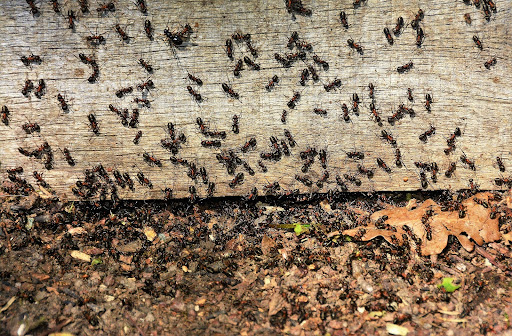Eco Friendly Ant Control Tips: How to Keep Your Property Ant-Free This Summer
As the temperatures rise and summer arrives, so do the ants. Ants are one of the most common pests that invade homes and gardens during the warmer months, seeking food and shelter. While they are not directly harmful, their presence can become a nuisance if left unchecked. Fortunately, with a few preventative measures and control strategies, you can keep your property ant-free this summer. In this article, we’ll explore effective ant control tips to protect your home and garden from these unwanted visitors.
Why Ants Invade Homes in the Summer
Ants are more active during the summer months due to the warm weather, which triggers their foraging behaviour. They invade homes in search of food, water, and shelter, typically building colonies in your walls, foundations, or garden soil. Some common species include the black garden ant, which is frequently seen indoors, and the pharaoh ant, which can be harder to eliminate.
Top Ant Control Tips
1. Seal Entry Points
One of the most important steps in ant control is preventing ants from entering your home in the first place. Ants can find their way inside through tiny cracks and gaps in windows, doors, and walls.
- What to Do: Inspect your home for potential entry points, such as cracks in the foundation, gaps around windows and doors, or spaces around utility pipes. Use eco-friendly sealants, such as silicone caulk, to block these gaps and create a barrier against ants.
2. Keep Your Home Clean
Ants are attracted to food, particularly sugary and greasy substances. Ensuring that your home is clean and free of food crumbs is essential to keeping ants away.
- What to Do: Wipe down kitchen surfaces regularly, sweep floors, and store food in airtight containers. Don’t forget to clean up spills immediately, and avoid leaving dirty dishes in the sink overnight.
3. Eliminate Water Sources
Ants, like all living things, need water to survive. Standing water or moisture around your home can be a major attractant.
- What to Do: Repair any leaky pipes, faucets, or drains to eliminate moisture. Make sure to dry out wet areas, such as under sinks, and avoid leaving pet water bowls out overnight.
4. Use Natural Repellents
Many natural products act as ant deterrents, keeping them away from your property without the need for harmful chemicals.
- What to Use:
- Vinegar: Mix equal parts of water and white vinegar in a spray bottle and apply to areas where ants are commonly seen.
- Peppermint Oil: Ants dislike the strong scent of peppermint. Apply peppermint oil around entry points or areas where ants congregate.
- Cinnamon: Sprinkle cinnamon along ant trails or near their nests to disrupt their foraging behaviour.
5. Set Up Ant Bait Stations
Bait stations are a highly effective method for eliminating entire ant colonies. Worker ants carry the bait back to the nest, where it is shared with the rest of the colony, including the queen.
- What to Do: Place eco-friendly ant bait stations near ant trails, entry points, and areas where ants are commonly found. Over time, this will reduce or eliminate the colony.
6. Keep Your Garden Tidy
Ants often establish colonies in gardens before moving indoors. Keeping your garden tidy is essential to preventing outdoor ants from making their way into your home.
- What to Do: Trim bushes and trees that are close to your home, and keep your lawn cut short. Remove debris like piles of wood, leaves, or rocks that could serve as nesting sites.
7. Remove Food Sources in the Garden
If you have fruit trees, vegetable gardens, or outdoor dining areas, be aware that these can attract ants.
- What to Do: Harvest ripe fruits and vegetables promptly, and avoid leaving food scraps or pet food outdoors. Clean outdoor dining areas after use, and ensure that bins are tightly sealed.
8. Create Physical Barriers
Physical barriers can prevent ants from accessing your home or garden. Here are two effective options:
- Diatomaceous Earth: This natural powder, made from fossilised algae, is safe for humans and pets but lethal to ants. Sprinkle it along ant trails, around the perimeter of your home, or in areas where ants are active to create an effective barrier.
- Chalk: Drawing a chalk line around entry points can deter ants, as they typically avoid crossing over chalk lines.

What to Do If You Have an Ant Infestation
If you’ve followed these steps but still have an ant problem, it may be time to seek professional help. Tech Country Pest Control offers expert, eco-friendly ant control solutions that are safe for both your home and the environment. Our professionals can assess your property and offer customised treatments to eliminate ants at the source.
When to Call a Professional: If you notice large numbers of ants, recurring infestations, or have difficulty locating the nest, it’s best to call in professional help. Pest control experts use specialised eco-friendly products and techniques to rid your home of ants effectively and safely.
Conclusion
Ant infestations can be frustrating, but by using these eco-friendly ant control tips, you can keep your home and garden ant-free this summer while maintaining a safe and healthy environment for your family and pets. Preventative measures like sealing entry points, using natural repellents, and maintaining a clean home are key to long-term success.
However, if your ant problem persists despite your best efforts, don’t hesitate to reach out to Tech Country Pest Control. We specialise in providing safe, eco-friendly pest control solutions that protect your home and the environment.
Take Action Today
At Tech Country Pest Control, we offer professional, eco-friendly ant control solutions that are effective for both homes and businesses. Don’t let ants take over your property, contact us today to schedule a consultation and get started with a customised treatment plan that fits your needs and enjoy a pest-free summer.
